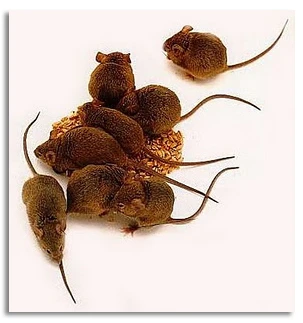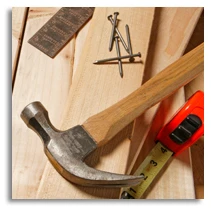Get Rid of Mice: Detect and Prevent Rodents From Entering Your Home
Fall is upon us. The cooler nights provide incentive for critters such as mice and other rodents to seek your nice warm living space for their comfort. Mice are equal opportunity intruders. They don't care if your home is a 20-room mansion or a one-room shack, they'll move right on in. In the fall, all that a mouse is looking for is some food and warmth -- and to a mouse any house is better than freezing outside. If you think mice might be targeting your home, here are some tips for finding out if they are already inside, how to get rid of them if they are, and how you can keep them from getting in to start with. Oh, and one little reminder....where there is one rodent, there may be dozens!

Figuring Out If You Have Mice
Mice aren't smart enough to know how to avoid attracting attention to themselves, so they will make noise and leave their marks around the house. If you listen at night, you can often hear them rustling around in your walls or ceilings. You might see small holes gnawed in bread bags or cereals and the inevitable mouse droppings left behind in drawers and on counter tops. If you're not sure whether you have mice in your home, put some talcum powder or flour near where your think they might be and leave it for a few days (and nights). If you've got mice, you'll see tiny mouse footprints tracking through the flour.
How To Get Rid of Mice
Start by getting rid of any potential food sources for them. Clean up any spills or crumbs in cupboards and put your dry food in glass or metal containers. Seal openings from the outside that might allow more mice to get in.
Put out some traps to catch your uninvited guests. Old-fashioned spring traps work well and they're inexpensive. Place your traps along the walls where the mice move (since mice are almost blind they tend to stay close to walls). Some people suggest putting out your traps for a couple of days unset and without any bait in them, so the mice will get used to them. Bait your traps with peanut butter or chocolate (cheese only works in the cartoons) and check them regularly. Give the traps a couple of days and if they don't capture any mice, relocate them to a different area.
If you just want to catch your mice to remove them, there are a number of different live traps available as well. Just remember, if you do decide to use live traps, you need to check them often (at least daily) or the trapped mice will end up dying slowly in the traps. Also make sure you release your captured mice at least a quarter of a mile away from your home or they could be back inside before you are.
Keeping Mice Out of Your House

Take a walk around the outside of your house and look for any openings from outside (no matter how small you think they are). Check electrical or gas pipe entrances, outdoor water taps and air conditioner connections. A mouse can get through an opening as small as a person's baby fingernail, so even a tiny gap is an open invitation to a mouse. Seal any openings you find with expanding foam insulation, caulking, metal screening or a small piece of sheet metal cut to fit. Steel wool can also do a good job since mice don't like to chew on metal, but it will rust and deteriorate and need to be replaced after a few years. Make sure your soffits are tightly fastened. An opening in a soffit will allow mice to get into your attic and then right down into your home. Mr. Handyman can provide carpentry services to repair any rotten wood or damaged areas.
Locate compost or woodpiles well away from your house and build supports or use old pallets to get wood up off the ground. Mice can nest in them during the summer and move right on inside when the weather gets cold. It's also a good idea to keep bird feeders well away from your house so seeds lying on the ground won't attract mice. Clean up any spilled grass or plant seeds in your garage and store your trash in a metal container. Finally, clean up any pet food bowls so the mice won't be attracted to a midnight buffet of pet food.
Contact Mr. Handyman
Mice are more than just an aggravation; they can actually be dangerous. They carry infectious diseases that can be harmful to humans, so if mice have gotten into food in your home, don't take any chances, just throw it away. Stay safe by wearing gloves when handling mice or traps and always wash your hands after handling anything that might have had contact with them.
If you could use some help or do not desire to take these projects on yourself, Mr. Handyman is fully prepared to handle these and any other home repair and home maintenance services that require attention while we're in your home.
 Click to call
Click to call


